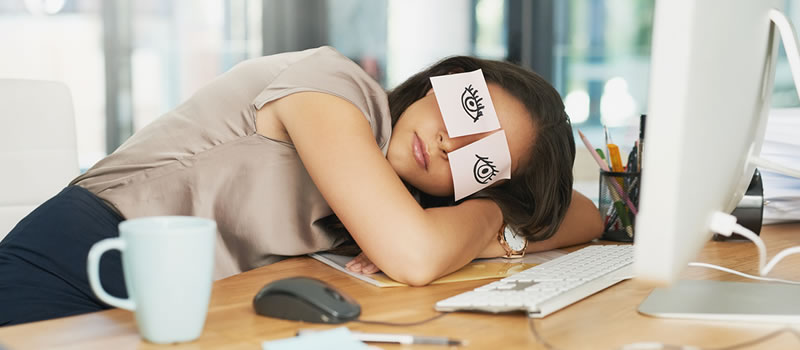Why do you always feel tired?
Published April 13, 2021

Do you find it difficult to get out of bed in the morning, find yourself yawning every five minutes throughout the day and feel like having a daytime nap under your desk? Most of us feel tired occasionally, but if you always feel tired you might need to look at your sleeping habits.
Reasons for feeling tired
One of the major causes of feeling tired is sleep deprivation. We are all guilty of skimping on sleep in the hopes of getting more done, which is can be harmful to our health.
Other factors that may contribute to feeling tired all the time include:
Environmental factors — Being disturbed throughout the night by a snoring partner, crying baby, noisy neighbours, an uncomfortable mattress or a change in temperature can impact your sleep significantly. Sleep quality is just as important as sleep quantity and continuity is an important factor in determining whether you sleep is refreshing.
Sleeping problems — Sleeplessness (difficulty falling asleep, staying asleep or waking unrefreshed) may contribute to persistent daytime sleepiness.
Shift work — It is very difficult for most people to get restful sleep when doing shift work, especially night shifts, which may disturb the body’s internal clock. Being awake for even just one night can cause tiredness. A study found that when young healthy males were kept awake for 21–23 hours, they experienced increased fatigue levels regardless of the number of hours they had slept prior.
Changes in time zone — Jet lag may cause daytime sleepiness because the body is out of sync with its natural environment. Symptoms of jet lag are generally worse the more time zones are crossed.
Mental State — If you are feeling out of sorts, it might keep you awake at night which will make you prone to sleepiness during the day.
Medication — Some medication can disrupt sleeping patterns.
Medical conditions — A number of medical conditions are associated with disturbed sleep that may be responsible for excessive sleepiness.
Not eating enough — Not eating enough food can zap energy levels. We need the calories in food to use as a fuel source to function. To ensure we feel our best each day, we should aim to include a variety of food choices from the main food groups including vegetables, fruits, grains, lean meats, poultry, fish, eggs, nuts/seeds, legumes/beans and milk, yoghurt, cheese and/or alternatives. Carbohydrates provide us with a range of nutrients and are a major main source of energy. We should be aiming for 45–65% of total energy intake to come from carbohydrate sources, 15–25% from protein and 20–35% from fat.
Dehydration — Water is essential for our body to perform all our necessary bodily functions. If we lose water (either through urination, sweat, stool or our breath) it needs to be replaced. Even mild dehydration can lead to decreased energy and inability to concentrate. Most adults lose between 2.5–3 litres of water every day. The recommended amount of fluid we need each day depends on multiples factors including your age, gender, activity levels, pregnant or breastfeeding and the environment you live in.
Not enough exercise — Being sedentary can lead to fatigue. But, engaging in physical activity can improve overall health and wellbeing through stress reduction, improved fitness and increase energy levels.
How to feel more energetic during the day
Of course, the best way to stay awake during the day is to make some lifestyle adjustments to improve your sleep quality. In addition, the following self‐help strategies may help you to stay awake and minimise tiredness.
- Exercise regularly and maintain a healthy body weight. Try to exercise outdoors in the morning especially if you have had a sleepless night.
- Include whole grains, plenty of fresh fruit and veggies, lean meats, legumes, at least two litres of water in your diet and reduce caffeinated beverages, alcohol and processed foods.
- Take a good quality multivitamin to boost up your daily intake of vitamins, minerals and other important nutrients. Check out Nature’s Own range of multivitamins.
- If necessary, take a brief “power nap”, to help you stay alert. Keep naps to 15–30 minutes, as anything longer than this may result in feeling groggy.
- Winding down after a stressful day is important in preparing your body for sleep but is often overlooked. Having a wind-down routine doesn’t have to be complicated or long. It could simply be reading a book under low light, doing some light stretching or deep breathing, writing tomorrow’s to‐do list in a journal to free your mind up, having a herbal tea or calming hot drink such as warm milk. Be consistent and these simple routines may help you reduce your sleepless nights and stay awake throughout the day.
How can Nature’s Own Help
If you have trouble getting a good night’s sleep that is leading to tiredness during the day, Nature’s Own has a range of products that may be able to help. Check out Nature’s Own product range.
MAT-AU-2003177
Learn about which Nature's Own product may be appropriate for you.
SEE THE PRODUCTS HERE






